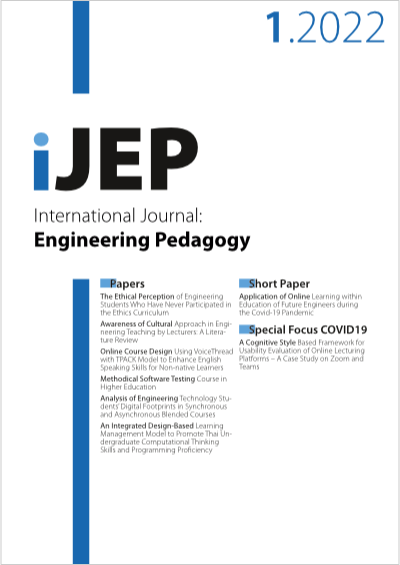An Integrated Design-Based Learning Management Model to Promote Thai Undergraduate Computational Thinking Skills and Programming Proficiency
DOI:
https://doi.org/10.3991/ijep.v12i1.27603Keywords:
computational thinking, design-based learning, participatory action research, programming, ThailandAbstract
The study applied concepts of computational thinking, waterfall programming, and design-based learning management (DBLM) combined with a participatory action research (PAR) methodology to obtain an integrated learning management model (LMM) designed as a base to promote computational thinking skills (CTS) and programming proficiency. The study used three groups consisting of 21 volunteer computer science undergraduate students, three teachers, and three computer studies graduates from the Computer Studies Department of the Faculty of Education at Thonburi Rajabhat University in Thailand. To verify the model, nine educational experts conducted an assessment of the proposed model, and determined that the evaluation standards were overall at a high level (x ̅ = 4.23, SD = 0.44), with the experts feeling that the integration of the DBLM computational thinking framework, the Waterfall programming conceptual framework, and the PAR met the study's stated objectives at the highest level (x ̅ = 4.56, SD = 0.53). The proposed model is best undertaken in five week sessions of five hours each using five exercises per week. In doing each activity, the effectiveness of each activity is to be measured by taking notes, worksheets, and practice skills. The resultant outcome was that the groups jointly participated in finding a model which offered CTS and programming skill training which encouraged the participants to learn together to develop activities based on common needs.
Downloads
Published
2022-02-10
How to Cite
Prommun, P., Kantathanawat, T., Pimdee, P., & Sukkamart, T. (2022). An Integrated Design-Based Learning Management Model to Promote Thai Undergraduate Computational Thinking Skills and Programming Proficiency. International Journal of Engineering Pedagogy (iJEP), 12(1), pp. 75–94. https://doi.org/10.3991/ijep.v12i1.27603
Issue
Section
Papers
License
Copyright (c) 2021 Paitoon Pimdee, Phattharapol Prommun, Thiyaporn Kantathanawat, Thanate Sukkamart

This work is licensed under a Creative Commons Attribution 4.0 International License.


